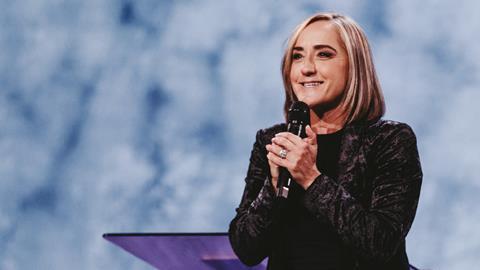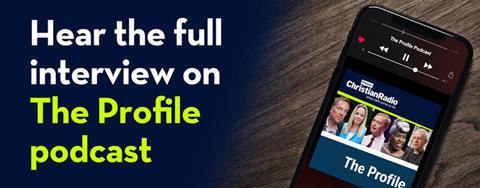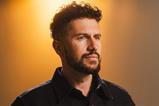There is an honesty about Christine Caine that is rare in high-profile leaders. When the bestselling author, internationally acclaimed speaker and leader of multiple international organisations appears on our morning Zoom call, she is straight off the treadmill, laughing and apologising for her appearance in a sorry-not-sorry way that epitomises her no-nonsense attitude. “I cannot be made up like I am for television for everything I do, or I will never have a life!” she says. “So here I am! I want to share my life, not a filtered life.”
In both her writing and speaking, no topic is off-limits – whether it is the sexual abuse she suffered as a child, finding out that she was adopted in her 30s, battling thyroid cancer in her 40s, or the panic attacks that she started to experience in her 50s. It was this last experience, she says, which prompted the writing of her latest book How Did I Get Here? Finding your way back to God when everything is pulling you away (Nelson). There was no big crisis of faith, she says, just a build-up of the pressures of life and the responsibilities that she carries. Before she knew it, she was struggling. Referencing Hebrews 6 she tells me, “It doesn’t matter if you’re a global evangelist or somebody that nobody knows. All of us are prone to drifting if we do not stay connected to Jesus, who is this hope we have as an anchor for our soul.”
In person, Caine is funny, loud and unapologetic. She’s as passionate about seeing souls saved as she is about social justice – “I’m like an old-school revivalist!” she tells me. A21, the anti-trafficking organisation that she and her husband founded, has seen more women rescued and more traffickers prosecuted during Covid-19 than at any point in its history. The couple also run a network of churches in Europe, as well as Propel Women, a ministry that aims to equip women to fulfil their God-given purpose.
Whether you’re listening to her speak or reading one of her many books, Caine’s hard-won wisdom flows freely. It is difficult not to be inspired by her passion for Jesus and her unwavering belief that God is still in the business of doing what the Bible says he’s always done. Yet hers is no pretty, polished story, and the frankness with which she addresses her own shortcomings, doubts and fears makes it, and her exhortation to keep chasing after the kingdom of God, even more compelling.
SO MANY THINGS WE CALL BIBLICAL ARE JUST CULTURAL
For those that have not come across you before, tell us a little about yourself
I was born in Sydney, Australia. I’m the daughter of Greek immigrants. But when I was 33, I found out that I had been left in a hospital, unnamed and unwanted when I was born, and then I had been adopted. It’s quite a shocking thing to find out you’re not who you thought you were. Also, I was the victim of sexual abuse for many years. My immediate family were great, it was just that they allowed people into our home, that they should have been able to trust, that were untrustworthy. And so that, as you could imagine, messed me up. I was full of shame, guilt, anger, unforgiveness and bitterness. As a young woman, I was making a lot of poor choices. I had developed a lot of patterns of destructive behaviour and negative thought patterns.
The big turnaround in my life was at Sydney University. A friend told me that there was an evangelist from England, a Cypriot Greek called J. John. My life was as far away from God at that point as you could imagine [but] I went into this seminar, and this dude speaks the gospel in a way that was just so profound to me. I think a lot of my past had really caught up with me, and so I was very sceptical about the love and the grace of God. He just kept inviting me out with his team for coffee. And that was pivotal in bringing me to a saving relationship with Jesus. A couple years after that, I ended up in a local church in Sydney, where I really started to grow as a disciple of Jesus.
It shows you that there is a spirit realm to all this, which gives me great faith for the gospel around the world. The Holy Spirit draws people to Jesus, whether we understand it or know it, it’s just a mystery.
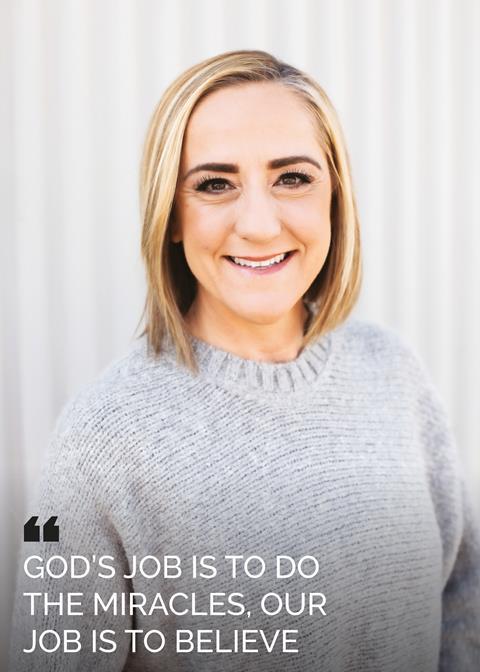
In the years since, you’ve been pretty busy. Anti-trafficking work, church planting, women’s networks, speaking, writing – is there any part of life that you don’t want to tackle?
It sounds broad, but you think of the kid left in a hospital – it would be just like God to take an unnamed, unwanted, abused, adopted girl and go: “I’m going to redeem all of those fragments of your broken past and put them together as a tapestry of my grace.” Your past will do one of two things: either shame, guilt, regret, condemnation will cause you to shut down, or God can take those fragments and give someone a future.
Every time we put a trafficker in jail, I feel like Joseph in Genesis 50:20, who says to his brothers: “You meant this for evil against me, but God meant it for this very purpose.” The greatest thing I can do is bear much fruit. It sounds exhausting – and it would be if I was striving – but it’s a response to the invitation of God. As long as I’m abiding in him, then the testimony is, he says: “No eye has seen, no ear has heard, nor has it entered into any person’s heart the things that God has for those that love him” (1 Corinthians 2:19). We read that stuff, but I don’t know if we really believe it. God’s job is to do the miracles, our job is to believe.
So it’s more about our faith levels than our ability – is that right?
Oh, absolutely. There are no super-Christians, there’s an amazing God. The issue is whether we believe God is who he says he is. We say things like: “God will use ‘the foolish things of the world to confound the wise’,” (1 Corinthians 1:27) and then when he does, we don’t like it.
My goal isn’t to be a career Christian. My goal, in my openness, is to say: “God can use anyone.” I believe there’s a heaven and hell, that Jesus Christ died on the cross, was buried and rose again for our sins. I believe he is coming back. And I believe that impacts 24 hours of our day, seven days a week and every sphere of life. I live like a radical because I think we all should. I want us all to make it to the finish line. You’ve got to keep stirring up that gift of faith, which really prompted the writing of How Did I Get Here?, because I just hit this moment – the perfect storm, like everyone’s been through in the last few years. Relational challenges, staff challenges, the whole world shifting and it was like: “Chris, do you want to keep your foot on the gas?” I could cruise – I’ve got so much momentum from 30-odd years of serving Jesus. Do I cruise into the second half of life?
THE PANDEMIC HAS CAUSED PEOPLE TO DRIFT FROM CHURCH…IT’S TIME FOR US ALL TO CHECK OUR MARKERS
This new book is incredibly timely; did you start planning it before lockdown happened?
I wrote the last chapters during the first three months of lockdown. What I went through in 2016-2017, I think God was preparing me for what everyone else was going to go through in 2020. And if I could get to a place where I’m thinking: “How did I get here?” there’s got to be a lot of other people going, “How did I get here? Where am I?”
So I thought: OK, I’m gonna put it all out there. Paul says: “one thing I do: forgetting what is behind and straining towards what is ahead, I press on” (Philippians 3:13-14). Pressing on in today’s culture is costly. The way the currents have shifted in society, no matter who you are – whether you have a blue check mark [on your social media] like me, or whether you’ve got five followers is irrelevant. In your workplace, on your street, in your community, in your home, to be an authentic, passionate follower of the Lord Jesus Christ in this era in the West is extremely costly.
You have to make that decision. If I’m going to follow him, I’ve got to deny myself, take up my cross. A lot of us have drifted from that call of discipleship. We think discipleship is: “I’m going to be a better version of me, God’s going to give me whatever I want, I’m going to live my best life now. Everything’s going to be awesome.” And that is drifting so far from what New Testament discipleship really is.
Do you think there’s a lack of urgency in Western Christianity, because we’re too comfortable?
If you don’t feel an urgency, which most don’t, what results is drifting. Hebrews 2:1 says: “We must pay the most careful attention, therefore, to what we have heard, so that we do not drift away.” Many have been drifting for decades.
I feel like it’s almost life and death in this hour. I’m watching people deconstruct their faith, prominent leaders renouncing Jesus. I wanted to be open: drifting isn’t always “I’m leaving Christianity, I’m going to start doing sex, drugs, rock and roll” Drifting can be as subtle as taking your foot off the gas, going: “It’s too costly to keep pressing on, I’m just going to slow down a bit.” We need to examine our hearts. The pandemic has caused people to drift from so many things – faith, church, relationships. It’s time for us all to check our markers. All you have to do to drift is nothing.
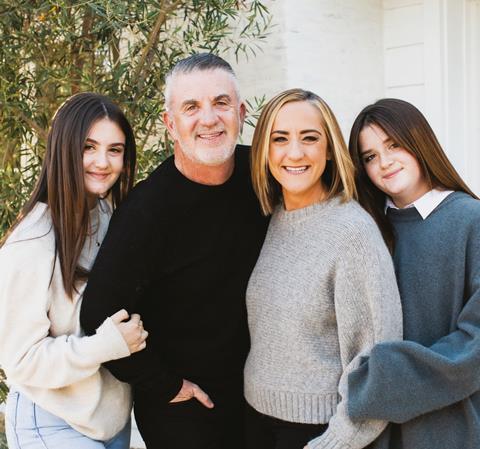
You live all of your life with the utmost transparency – including your family life. What lessons have you learned about partnering well in marriage and ministry?
Deuteronomy 32:30 says: “One will put 1,000 to flight, two will put 10,000 to flight.” For me, love would not have been enough to get married. The Lord had to show me, through his word, that by marrying Nick we would have a ten-fold impact. We did a lot of hard work before we got married, which has meant a lot less friction, because all those big conversations about purpose, travelling, doing whatever Jesus called us to do, family life and how that would look were done before we got married.
We’ve never been in competition with each other. We’ve always been Jesus first, kingdom first. We’ve never sat down and had this big discussion like: “You are the man and I am the woman, so I have to wash dishes and underwear and that makes me somehow more biblical” – whatever that means. So many things we call biblical are just cultural.
Just love God, love people, love each other. Be kind and good. It’s not complicated. Have the fruit of the Spirit in your marriage. Say “sorry” really quickly. You do not need to read Greek, Hebrew and Aramaic to have a happy marriage, just be a Christian!
IT IS EXTREMELY COSTLY TO BE AN AUTHENTIC FOLLOWER OF THE LORD JESUS CHRIST
This year, people have had to cope with things they never thought they’d have to cope with. What does the Church need to do from here?
My friend Alan Hirsch says: “We have to read Jesus” – meaning just come back to that central place. What we have learned in this last year, if we hadn’t known it already, is that you can’t put your hope in anything else. I think the Lord has given us this invitation. Let’s crack open the Gospel of Luke and just read it again. What did Jesus look like? What did Jesus say? How did Jesus act? Am I talking like this? Am I acting like this? Do I seem like this in my workplace, my family, on social media? Let’s get anchored.
Your significance and security is not going to come from a ministry, church, career, salary, title. Your value can only come from Jesus. He is this hope that we have; nothing else is going to do it. We’ve seen that, this last year, everything else has been shaken. Hebrews 12:27 says: “Only those things that can be shaken will be shaken so that those things that cannot be shaken shall remain.” We’re about to go back out into the real world again and what is the only thing that wasn’t shaken? Jesus. So if you are rooted and grounded in Jesus and anchored to Jesus, you’re good. You’re going to be OK.
How Did I Get Here? by Christine Caine is available now
To hear the full interview listen to Premier Christian Radio at 8pm on 3 July or download The Profile podcast













